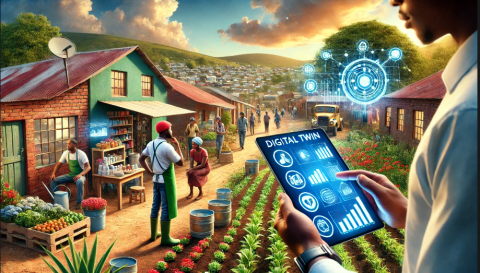The Role of Digital Twins in Township Businesses: A Gateway to Innovation in Goods Sales and Farming
Digital Twins, a cutting-edge technology originally designed for complex industries such as manufacturing and aerospace, are now finding broader applications in more localised settings. Digital Twins create a virtual replica of a physical object, system, or process, enabling real-time simulation and analysis. In the context of township businesses, whether in farming or retail, the potential for Digital Twins is vast, offering practical and cost-effective solutions for improving operations, decision-making, and profitability.
What Are Digital Twins?
A Digital Twin is a dynamic, digital replica of physical assets, processes, or systems. These replicas are kept in sync with the real-world objects they represent, using sensors and IoT (Internet of Things) technology. Data is continuously collected and fed into the virtual model, allowing users to monitor conditions, test scenarios, and predict outcomes before implementing them in the real world. Initially used in large-scale industries, this technology is now accessible and applicable to smaller-scale businesses, including those in South Africa’s townships.
Applications for Township Goods Retailers
For township retailers, using Digital Twins can streamline logistics, inventory management, and customer engagement. Township entrepreneurs, who often rely on small brick-and-mortar shops or informal setups, can utilise a Digital Twin to:
Track Inventory in Real Time: By integrating Digital Twin technology with point-of-sale systems, retailers can create a real-time digital version of their store’s inventory. This allows businesses to monitor stock levels, predict when items are running low, and automatically reorder stock, ensuring that popular products are always available for customers.
-Optimise Supply Chain Management: Township shops typically face challenges with supply chain logistics, including delayed deliveries or stock shortages. By simulating the supply chain in a Digital Twin, business owners can model different scenarios—such as adjusting delivery routes or managing supplier delays—to determine the most efficient ways to keep their shelves stocked.
-Customer Engagement and Personalisation: Digital Twins can help retailers analyse customer buying habits by tracking purchase histories and preferences in a virtual environment. This data can then be used to offer personalised promotions or product recommendations, creating a more engaging shopping experience for customers
Farming in Townships: How Digital Twins Can Help
In agriculture, Digital Twins are proving to be transformative, particularly for small-scale farmers who need to maximise their yields with limited resources. Township farming—whether in urban gardens, small plots, or communal farms—can benefit in several ways:
-Precision Agriculture: Digital Twins can help farmers monitor soil conditions, weather patterns, and crop health in real-time. By creating a virtual replica of the farm, sensors can gather data on soil moisture levels, temperature, and nutrient content, helping farmers optimise irrigation and fertilisation schedules. This leads to better crop yields and more efficient use of water and fertilisers.
-Predictive Maintenance for Farming Equipment: Township farmers often face equipment breakdowns that can delay farming activities and affect productivity. With Digital Twins, farmers can monitor the condition of their machinery in real-time, predict when maintenance is needed, and prevent costly breakdowns.
-Crop Simulation and Yield Prediction: Farmers can use Digital Twins to simulate different crop planting scenarios and predict the likely yields for each scenario. This allows them to experiment with new farming techniques or crop rotations in the virtual space before applying them in real life, reducing the risk of failure.
The Township Model: Access and Affordability
While Digital Twins may sound expensive or out of reach for small businesses in townships, they are becoming increasingly accessible thanks to advancements in IoT and cloud computing. Many solutions can now be customised for smaller operations, meaning that township retailers or farmers don’t need to invest heavily in infrastructure. For example:
-Subscription-Based Digital Twin Platforms: Instead of buying expensive software outright, township businesses can opt for subscription-based models where they pay a small monthly fee to access the Digital Twin platform.
-Mobile Integration: Township entrepreneurs can use mobile apps integrated with Digital Twin systems to monitor their businesses or farms remotely, using just a smartphone. This makes it easier to manage operations on the go, which is crucial for small business owners who often juggle multiple responsibilities.
Conclusion: A Blueprint for Township Success
Digital Twins represent a game-changing technology that township businesses can harness to optimize their operations, reduce costs, and enhance customer satisfaction. Whether it’s through better inventory management for retailers or precision farming for local growers, this technology offers practical, scalable solutions that can drive growth and sustainability in South African townships. As more businesses adopt these digital tools, the township economy stands to benefit from increased efficiency, productivity, and ultimately, profitability.






Digital Twins are such a game-changer for township businesses! From farming to retail, they make it easier to test ideas, improve operations, and boost profits without breaking the bank. The future looks bright with this kind of tech!